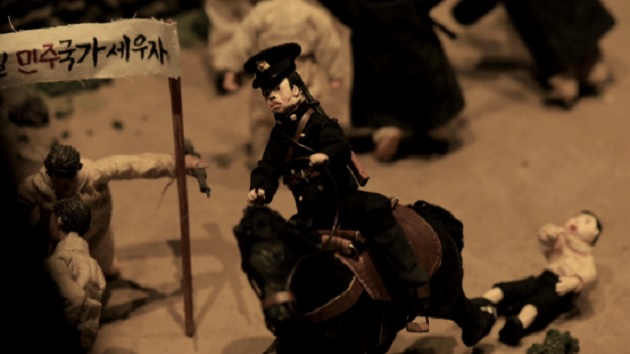
This coming Saturday will be the 73rd anniversary of the island's tragic April 3rd Incident.
This year’s anniversary adds more meaning to the anniversary, as the all-around revision bill for the April 3rd Special Act was passed by the National Assembly.
Today, we’re taking a deeper look into the causes and lessons we might learn from our history. Joseph Kim reports
Report
This is (북) Buk Elementary School, which has a 114 year-long history.
A rally to commemorate the 28th anniversary of the March 1st Independence Movement was held at this school on March 1st, 1947.
It was attended by some 30,000 people, an unprecedentedly large number. They had gathered under the slogan, “Let’s unify independent Korea in the March 1st spirit.”
At the rally, a child was struck by a police officer’s horse.
However, the police officer left the site without an apology.
This caused the crowd to turn into protesters against the offence.
In response, police opened fire into the crowd, killing six civilians near (관덕정) Gwandeokjeong Pavilion.
Park Tae-gyun / Dean, Institute of International Affairs, Seoul National University
The island was not divided. Jeju people seemed to be shocked by the police’s firing that killed innocent civilians.
< 박태균 / 서울대 국제대학원장 >
제주도는 그 정도로 분열이 돼 있지 않은 상황에서 그 행사를 하는데 발포가 이뤄졌고, 사람이 죽었다, 무고한 시민이 죽었다라는 건 제주도민들한테는 큰 충격으로 다가갔던 것 같아요.
In protest against police atrocities, Jeju residents then collected condolence money for bereaved families and staged a general strike, which was even joined by officials employed by the U.S. military government and some policemen.
However, the military government and police refused to admit responsibility for the killings and went on to bring more police officers from the mainland.
About 500 residents were arrested for a month.
The brutal suppression continued for more than one year, and the number of detainees went up to 2,500. Three died due to torture.
The brutal crackdown by the U.S. military government here was the trigger for the April 3rd Incident.
Yang Jo-hoon / Chairperson, Jeju April 3rd Peace Foundation
The island was deeply wounded by the U.S. military government because of the brutal crackdown. This triggered the April 3rd Incident.
< 양조훈 / 제주4·3평화재단 이사장 >
제주 사회는 어쩌면 미군정과 제주도민 간의 간격이 물과 기름처럼 깊은 상처가 생기는 거죠. 바로 이런 과정을 거쳐서 결국 4·3 무장봉기가 일어나는 것이죠.
If the police’s mistake and shooting were settled peacefully 70 years ago, the April 3rd Incident could have been avoided.
History teaches us that peace and reconciliation are one of the very important values we must not forget.
Joseph Kim, KCTV




